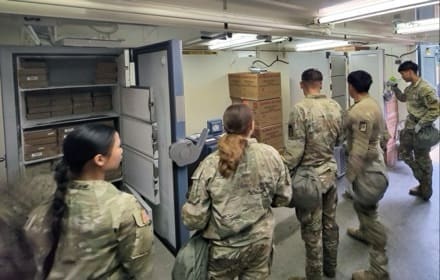JOINT BASE LEWIS-MCCHORD, WA–The U.S. Army Medical Test and Evaluation Activity (MTEAC), in collaboration with the U.S. Army Medical Materiel Development Activity (USAMMDA) Program Executive Office (PEO) Soldier, Soldier Medical Devices (SMD), conducted a significant operational test of advanced blood storage technologies from August 16 to 19, 2024. This test was carried out with the support of the 153rd Medical Detachment, Blood Support (MDBS), and the 551st Medical Company-Logistics of the 62nd Medical Brigade.
The operational test aimed to determine the suitability, survivability, and reliability of several new blood management systems, including the Freezer Ultra Low Temperature (FULT), the Blood Plasma Freezer, the Platelet Agitator and Incubator (PIA), and the Dry Block Heat Incubator. These systems are potential replacements for the aging equipment currently used by the 153rd MDBS, which is approaching the end of its lifecycle.
To support the Army’s modernization efforts, these new systems feature advanced capabilities such as modern interactive displays and improved system performance. The goal is to address capability gaps in Army laboratories and blood centers, ensuring more effective storage, maintenance, and delivery of blood products to Soldiers in the field.

The operational test was strategically designed to coincide with the 153rd MDBS and the 551st Medical Company-Logistics’ scheduled Field Training Exercise, ensuring that the evaluation of the new systems aligned with their Mission Essential Task List (METL) and MOS Individual Critical Task Lists (ICTLs) requirements. This integration allowed the test scenarios to not only assess the new technologies’ performance but also enhance the units’ readiness through realistic training exercises.
Prior to the record test, personnel from both units underwent training on the new systems, preparing them to deploy and operate the equipment effectively during the exercise. The operational test included various scenarios designed to stress the MDBS’s capabilities in receiving, storing, and transporting blood products. These scenarios were crucial in assessing the systems’ performance and ensuring they meet operational requirements.
Following the test, participants convened to review and discuss the performance of the new devices. Feedback from test players, and their command teams, emphasized the importance of thorough testing and user involvement to refine and enhance the systems before potential fielding. The command team also highlighted the value of this comprehensive testing in improving the efficiency of blood banks and ensuring that life-saving medical care is readily available to support Soldiers in combat.
By advancing these blood management systems, the Army aims to improve the readiness and effectiveness of its medical support units, ultimately ensuring that warfighters receive timely and critical care in dynamic operational environments.
Aligned under the U.S. Army Medical Center of Excellence, MTEAC is the only independent operational test and evaluation agency of medical and medical-related materiel and information technology products, supporting of the Army and DOD acquisition process. To learn more about the U.S. Army Test and Evaluation Activity and their mission visit medcoe.army.mil/usamteac.
By Mr. Eitter Rodriguez, U.S. Army Test and Evaluation Activity
You can skip to the end and leave a response. Pinging is currently not allowed.
Read the full article here








Leave a Reply